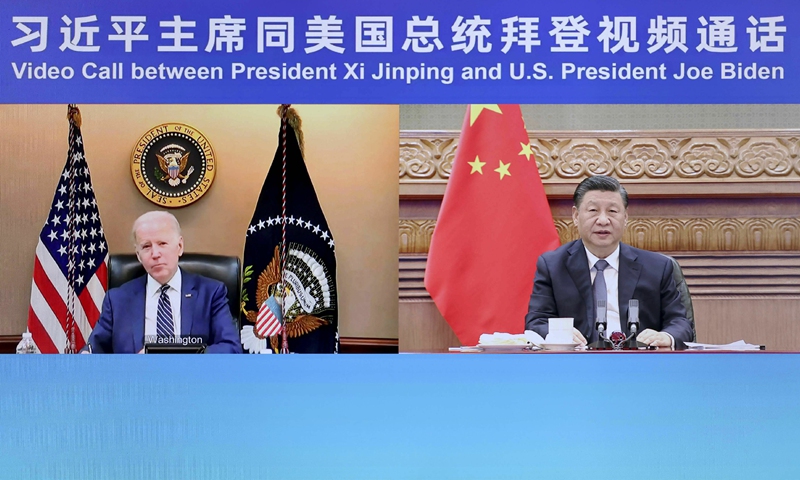On the evening of 18 March, Chinese President Xi Jinping had a video call with US President Joe Biden at the request of the latter. The two heads of state had a candid and in-depth exchange of views on China-US relations, the situation in Ukraine, and other issues of mutual interest. Both sides agreed that the video call was constructive. This is also the common feeling of the international community.
At a special moment when the Ukraine crisis affects the entire world, the two heads of state of China and the US, two influential global powers, had a constructive interaction. This is what the international community was expecting to see. It’s not only in line with the interests of both China and the US, but also will help safeguard regional peace and stability.
The video call between Chinese and US presidents expressed the common desire of both sides to effectively manage differences and promote the stable development of bilateral ties. It released a positive message to the world. Biden reiterated the commitments he made during his virtual meeting with Xi last November: the US does not seek a new Cold War with China; it does not aim to change China’s system; the revitalization of its alliances is not targeted at China; the US does not support “Taiwan independence”; and it has no intention to seek conflict with China. This, to a certain degree, reflects the strategic sobriety and rationality of the Biden administration.
The consensus reached by Chinese and US leaders could play a key role in setting the tone and guiding the development of China-US relations. It could steer the China-US relationship through storms and obstacles. If the consensus reached by the two presidents is well implemented, China-US relations won’t derail from the track.
It needs to be pointed out that the US didn’t do a good job in implementing the consensus reached by the two leaders in the past. Over the four months since the virtual meeting between the two presidents last time, the actions the US took against China mostly ran counter to Biden’s commitments. This has left the world with a deep impression that the US says one thing and does another. In particular, some people in the US have frequently sent wrong signals to the “Taiwan independence” forces. If such “playing-with-fire” behavior is not curbed, it will inevitably have a subversive impact on the China-US relationship.
This time, the leaders of the two countries directed their teams to promptly follow up and take practical actions to put China-US relations back on the track of steady development, and make respective efforts for the proper settlement of the Ukraine crisis. Next, we hope to see clear changes on the US side.
It’s worth noting that the two sides engaged in a round of fierce verbal war before the video call between the two heads of state. Some senior US officials made irresponsible remarks intensively in the past two days and even threatened to impose sanctions on China. China didn’t buy this. The Chinese side resolutely refuted the attacks and smears on it by the US side through media a few hours before the video call. “It is impolite not to reciprocate.” China has always valued diplomatic etiquette, but it pays more attention to the right and wrong.
The virtual meeting this time was requested by the US side and many have interpreted it as a signal that the US side wants to seek help from China over the Ukraine issue. The US wants China to be part of a comprehensive web of sanctions against Russia. But it needs to be said that China doesn’t have an obligation to cooperate with the US, and it doesn’t agree with such rough means of unilateral sanctions at all. The US must respect China’s different position so that the talks can continue. The Chinese side will never accept US’ coercion, nor will it allow the US to use the Ukraine issue to harm China’s legitimate interests. The Chinese side has made this point very clearly.
Just as President Xi underscored, there have been and will continue to be differences between China and the US. What matters is to keep such differences under control. During this virtual meeting, Biden mentioned the Shanghai Communique at the beginning. The ice-breaking of China-US relations 50 years ago was due to the political wisdom of seeking a common ground with existing differences. Mutual respect, peaceful coexistence and avoiding confrontation are the consensus reached by the two leaders. They should be converted into practical actions at various levels and areas by both sides.
The Chinese people always honor their promises. China will implement the important consensus reached by the two heads of state as usual. We also expect the US will match words with deeds, and act on what it says to show the world the integrity as a major power, and hope the US will work with China to safeguard world peace and tranquility.
Chinese President Xi Jinping speaks with US President Joe Biden in a video meeting on Friday.Photo: Xinhua




